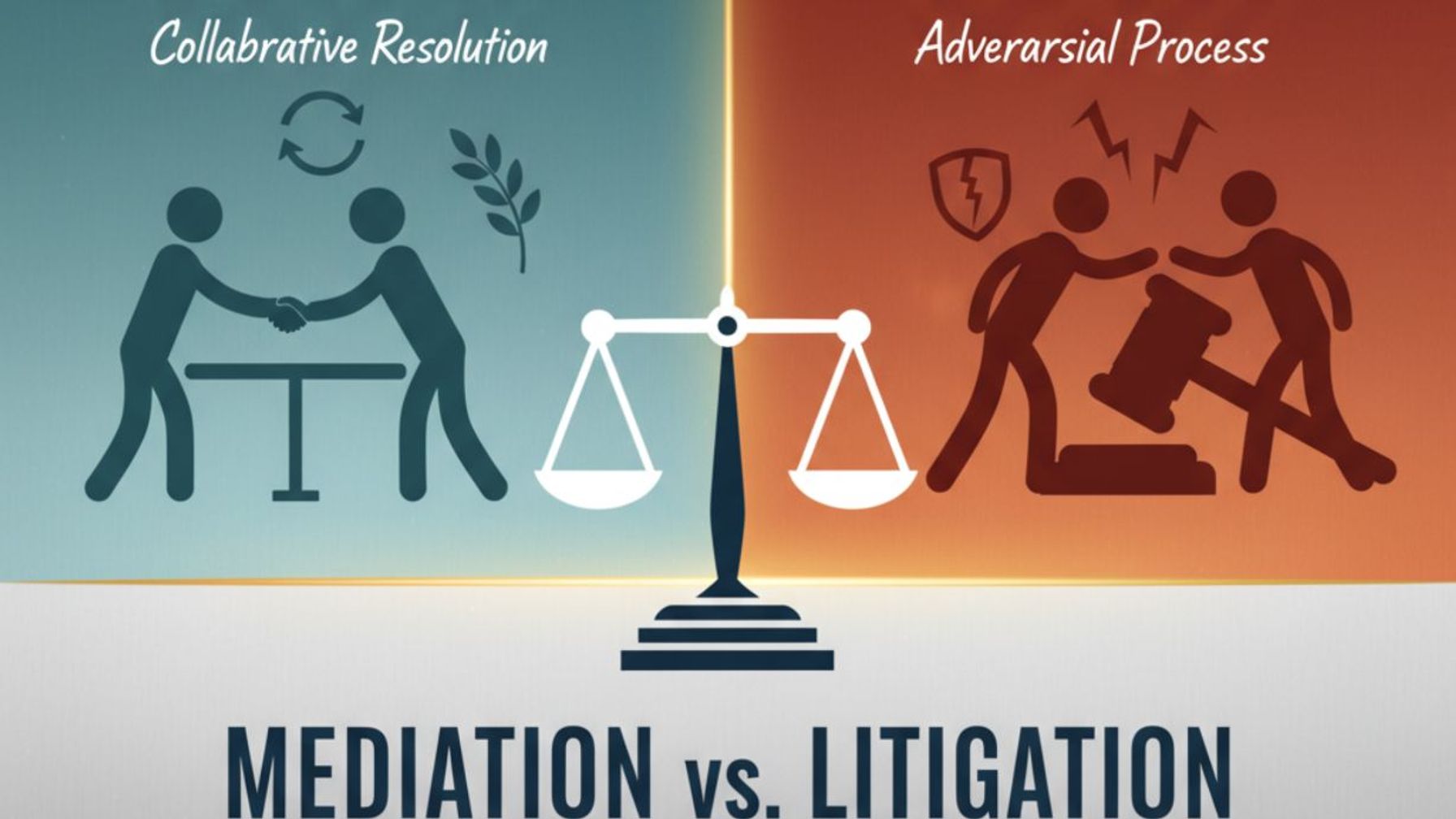When a marriage reaches a breaking point, one of the biggest challenges couples face is deciding how to end it. While divorce itself is an emotional process, the way you choose to handle it — through mediation or litigation — can make a big difference in how peacefully and quickly it moves forward.
In India, where family relationships and societal expectations hold great importance, the choice between mediation and litigation often depends on personal comfort, financial factors, and emotional readiness. Let’s understand both approaches and see which might work best for you.
What Is Mediation?
Mediation is a cooperative process where both spouses sit together, guided by a neutral third party called a mediator. The mediator helps the couple discuss issues such as property division, child custody, alimony, and other matters — with the goal of reaching a mutual agreement.
It’s not about winning or losing; it’s about finding common ground. Mediation allows both partners to talk openly in a private and respectful environment, often without the stress of long court procedures.
What Is Litigation?
Litigation is the traditional legal route where both spouses present their case before a court. A lawyer represents each side, and the judge makes the final decision on all major matters — from finances to custody.
Litigation becomes necessary when communication breaks down completely or when one partner is unwilling to cooperate or disclose important information.
While it provides a clear legal judgment and protection of rights, it can also be emotionally draining and time-consuming, as court cases often involve multiple hearings and formal procedures.
Mediation vs. Litigation: Understanding the Difference
The main difference lies in the approach. Mediation is guided by collaboration, while litigation is based on legal confrontation.
Here’s how they differ in simple terms:
- Control: In mediation, the couple makes the decisions together. In litigation, the court decides.
- Privacy: Mediation discussions are confidential. Litigation takes place in open court and becomes part of public records.
- Time & Flexibility: Mediation sessions can be scheduled based on convenience. Litigation depends on court dates, which can lead to delays.
- Cost: Mediation is usually more affordable because it involves fewer formalities. Litigation can become expensive due to extended court proceedings and legal fees.
- Emotional Impact: Mediation tends to reduce stress and hostility. Litigation can be adversarial, increasing emotional strain for both parties.
When Should You Consider Mediation?
Mediation can be a suitable choice if you and your spouse are willing to communicate and cooperate. It works best when:
- Both partners are open to discussing and compromising.
- You want a more private and peaceful resolution.
- You wish to maintain a respectful relationship — especially if you have children.
- You prefer to avoid lengthy and costly legal battles.
Many couples in India today choose mediation because it offers emotional relief, saves time, and keeps the matter discreet.
When Is Litigation the Better Option?
Litigation may be necessary when communication is not possible or when trust has completely broken down. It’s often the right approach if:
One partner is hiding assets or refusing to cooperate.
There are serious disputes involving child custody or property.
Domestic violence, emotional abuse, or manipulation is involved.
You need the court’s protection or enforcement of your rights.
In such cases, legal proceedings ensure that every aspect of the divorce is reviewed fairly under the law, and both parties get a proper judgment.
Which One Is Right for You?
There’s no single answer — every relationship and situation is different.
If your goal is to end the marriage peacefully while maintaining dignity and control over decisions, mediation is worth exploring. It helps couples part ways respectfully and focuses on solutions rather than conflict.
However, if your situation involves serious disagreements or safety concerns, litigation provides the legal framework and authority needed to ensure justice.
Ultimately, the choice should depend on your emotional comfort, the level of cooperation between partners, and the complexity of your situation. A qualified family lawyer can help you assess which option best protects your rights while minimizing stress.
Conclusion
Divorce is never just a legal matter — it’s an emotional transition. Choosing mediation or litigation depends on how you wish to navigate that transition.
Mediation focuses on cooperation, understanding, and privacy. Litigation ensures structure, clarity, and legal authority. Neither is right or wrong — what matters is choosing the approach that supports your peace of mind, protects your rights, and helps you move forward with dignity.
Conclusion
Divorce is never just a legal matter — it’s an emotional transition. Choosing mediation or litigation depends on how you wish to navigate that transition.
Mediation focuses on cooperation, understanding, and privacy. Litigation ensures structure, clarity, and legal authority. Neither is right or wrong — what matters is choosing the approach that supports your peace of mind, protects your rights, and helps you move forward with dignity.




